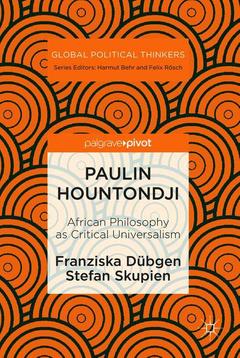Paulin Hountondji, 1st ed. 2019 African Philosophy as Critical Universalism Global Political Thinkers Series

Contextualises and presents Hountondji’s influential work to a new audience
Situates Hountondji's work amongst his contemporaries and compares it to approaches by African philosophers such as Henry Odera Oruka, Kwame Gyekye and Kwasi Wiredu
Explores the relevance of Hountondji's approach to contemporary transcultural political theory
Date de parution : 01-2019
Ouvrage de 192 p.
14.8x21 cm
Thèmes de Paulin Hountondji :
Mots-clés :
African philosophy; ethnophilosophy; endogenous research; universalism; Placide Tempels; Alexis Kagame; professional philosophy; Négritude; anthropology; African socialism; Anton Wilhelm Amo; collective reasoning; orality; popular knowledge; materialism; dependency theory; scientific dependency; scientific autonomy; scientific extraversion; Présence Africaine


